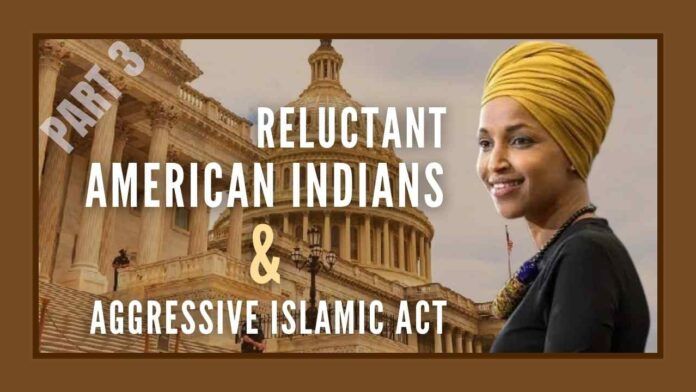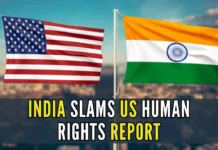
The previous part of the article can be accessed here Part 1, Part 2. This is the Part 3.
Reluctant Indian Americans should reject Islamic Act, it is reprehensible to its core
Have you heard the phrase or read the book, “Argumentative Indian?” We have another breed among us – the “Reluctant Indians” who hesitate to defend India, Hindus, and their national pride. Such reluctance will allow the Islamophobia Act to pass which stands to divide the world as Islamophobic and non-Islamophobic. The Act in itself is unjust and unwarranted and I question the U.S. authority to interfere and dictate about what and how other sovereign countries conduct their internal affairs. But Congresswoman Ilhan Omar, the main sponsor, and brain behind the Act is an aggressive activist with a known history of not only being controversial but highly polarizing and pro-Islamic. Her statements and actions have often bordered Jihadism, radicalization, and the preference for Sharia law. I hope none of us want any of these in the United States and India.
The Act is designed to label India (among other countries) as Islamophobic and put India on the defensive which India does not deserve. The question we want to address is the role of the Indian diaspora in the U.S., particularly, Hindu Indians (Hindu as an inclusive religion) and those opposed to the false narrative of Islamophobia. This narrative will set a very dangerous precedence that must be opposed by every fair-minded person. Inaction by the reluctant Indians will make anti-Indians spread bold, negative, and untruthful historical narrative and empower the Hindutva dismantling gang leaders like Audrey Truschke weaponize it in Tweets:
A number of Hindus committed terrorist acts against the British in the late colonial period. See Durba Ghosh’s 2017 book, titled Gentlemanly Terrorists: Political Violence and the Colonial State in India 1919-1947.
— Dr. Audrey Truschke (@AudreyTruschke) April 2, 2019
The reluctant Indian Americans often use excuses such as – why to get in controversy, does not affect us; why to bother; what difference will it make, too busy, don’t want to be us versus them. Indian diaspora should remember their good education in India which enabled them to come abroad. They should ask what they can do for their country of birth rather than the country expecting or requiring a justifiable compensation for educating them. The diaspora must weigh the consequences of the religion-based fractured world- Islamic versus non-Islamic which should only belong to insane.
The other question is what role should be played by the Associations using India or Hindu as part of their name? Most Hindu organizations have made the choice to stand for the Hindu cause but there are also reluctant Hindu organizations. I have noticed that the Association(s) using “India” have an identity crisis about why they use India and who they represent? Often, they disregard that modern independent India is a nation bounded by a geographical territory but her people are a mix of multi-cultural and multi-religious under one constitution but India has centuries-old heritage and culture.
The Associations often use India’s flag and/ or collect funds in the name of India and thus it is their moral obligation to educate about and advocate for India as one nation. They should not misrepresent people of India by different names, such as Indian community, Asian Indian, Indian-American (with the hyphen), Indian American, Southeast Asian community.
They should know that there is no prohibition for educating and/ or advocating on any subject for the right reasons as a 501(c)(3) nonprofit, non-political, and non-religious organization. Yet, some associations use that excuse to stay on the sidelines. For example, when I posted a chat about the Islamophobia Act, someone wrote, “stay away posting or forwarding anything that is divisive – religion or politics.” This individual failed to note that the Act is divisive not what I posted expecting advocacy against it. Such reluctant Indians must rethink about their loyalties to India as a strong democracy that offered them a good education, values, and ‘samskara’ or India as an Islamophobic nation which neither India is nor it can be.
The Act is reprehensible to its core and must be condemned at the grass-root level. This Act will widen the gap between Muslims and Hindus in India. Would the U.S. want bridging or widening the racial tensions and disparities between Blacks and Whites and/ or pit Christians against Muslims? People of different faith and racial background do have differences, and always will because they are people and not robots. Our collective strategy must aim at promoting harmony and compassion and not chaos and hate. The Act promotes the latter and therefore all right-minded individuals, groups, and associations must actively advocate for it to be dead on arrival in the House or not even get there.
Should there be choice or debate for rejecting religion-based bigotry and the discriminatory, accusatory, unjust, unacceptable, and unwarranted Act? The reluctant Indian Americans must reject the Act because if it becomes a law, their friends/ family will face consequences in the alleged Islamophobic India. It will unduly embolden anti-Hindu groups to engage in unnecessary protests, damage democracy, and distract India from its path of development.
Indian diaspora must mount the strongest advocacy effort to have the Act defeated which stands to divide our world. The message to Congresswoman Omar and other lawmakers must be clear that we want no part of such preconceptions of a divided world, religious bigotry, prejudices, Islamist ideas, and bad policy/ politics. The reluctant Indians must wake up not to let the U.S. (we call home) or India (we come from) advance to the religious bigotry as we celebrate Diwali symbolizing the triumph of good over evil and moving from the darkness of ignorance to the brightness of knowledge and wisdom.
As responsible citizens, we must ensure that the world remains free from undue U.S. interference in their internal affairs. We must question the need for a “special envoy,” listening and watching what the rest of the world does. Don’t we have the world of Facebook, Twitter, WhatsApp, Google, etc. causing a great deal of unwanted and unwarranted snooping and more harm than good? The U.S. has the USCIRF and Human Rights arm to watch the world except for our own backyard. Why do we need more? Instead, why not improve domestic acts of social injustice, racial disharmony and discrimination, events like incitement on Capitol Hill, and gun-related violence which are happening unabated?
The reluctant Indian Americans must not let the aggressive Islamism win the battle. The passage of the Islamophobia Act has too much at stake – the divided world, the damaged democracy, and untenable diplomacy.
Note:
1. Text in Blue points to additional data on the topic.
2. The views expressed here are those of the author and do not necessarily represent or reflect the views of PGurus.
PGurus is now on Telegram. Click here to join our channel and stay updated with all the latest news and views
For all the latest updates, download PGurus App.
- Education and election in Bharat: Race to the top - April 16, 2024
- Kejriwal: “An Insignificant Man” or a corrupt politician with impending prison term - March 24, 2024
- Bharat’s general elections and the Model Code of Conduct - March 22, 2024










